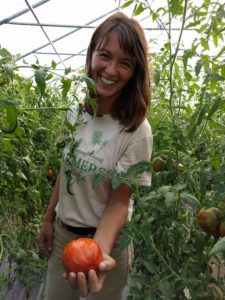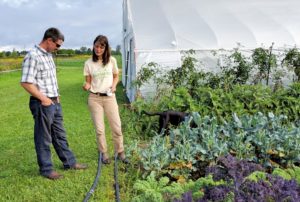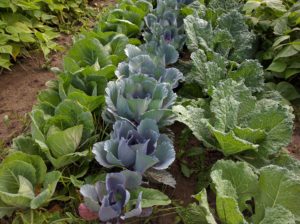
Sarah Longstreth shows off her favorite variety of tomato grown in one of three hoop houses she funded with an FSA Microloan.
USDA customers and partners are following the USDA motto of do right and feed everyone.
Sarah Longstreth, founder of Good Stead Farm, a source of fresh, local organic food in Midland County, Michigan, is no exception.
Longstreth has a background in agriculture and with the help of USDA programs, was able to start her own operation.
Feeding Others
Sarah started farming after graduating college, apprenticing on farms in Maine and Minnesota, and as far away as Jordan and Egypt. That’s when she decided she wanted to head home to Michigan and start her own farm.
Good Stead Farm is a staple for good food in the county. It’s a community supported agriculture (CSA) farm that feeds 60 families as well as sells at local restaurants and farmers market.
“We currently grow 10 months out of the year, producing for a three-season, 60-family CSA, three local restaurants and the Midland Farmer’s Market,” said Sarah, who founded the farm in 2015. “Our products include over 100 different varieties of nearly 45 vegetables, herbs and flowers, as well as pastured chicken and duck eggs and grass-fed and finished lamb.”
Sarah does all of this on just seven acres.

Longstreth, owner of Good Stead Farm, explains her method of crop selection to local FSA Farm Loan Officer, Joseph Johnston.
Extending the Growing Season
Sarah uses three hoop houses to extend the growing season on her farm.
Hoop houses, or seasonal high tunnels, are plastic covered structures that trap heat from the sun to create a warm climate. High tunnels help farmers extend the growing season – producing crops longer into the winter and earlier in the spring.
This not only improves a farmer’s bottom line, it also enables them to provide fresh, local produce for their communities, often year-round. High tunnels commonly incorporate other conservation practices, such as drip irrigation and cover crops, and protect plants from air pollution and pesticide drift.
Seeds of a New Business
Financing is a challenge for business start-ups, and it is especially true for small farms.
“I don’t have all these implements and all these really expensive machines,” she said. “If I’m not paying on my loan, what are [the lenders] going to take? My harvest tubs? My hand tools? My walking tractor?”
The financing challenge for small farms is often a matter of not having enough collateral in the beginning to offset a private lender’s risk in administering the loan. Small beginning farms typically have not yet built up the loan collateral needed for commercial lenders.
By networking with experienced farmers, Sarah discovered the farm loan programs available through USDA’s Farm Service Agency (FSA).
“FSA was a really awesome, easy way to think about financing the startup of the farm,” she said. “My loan officer was super great, and he was very supportive.”
The microloan program helped Sarah purchase cold storage equipment, a walking tractor and other start-up costs of Good Stead Farm.

Longstreth started Good Stead Farm with the plan to produce certified organic vegetables, greens, pastured poultry, eggs, pork and lamb.
Good for the Land
Good Stead Farm prides itself on using conservation practices that improve soil health and favoring heirloom and heritage plant and animal species.
In addition to using hoop houses, Sarah worked with USDA’s Natural Resources Conservation Service (NRCS) to plan and implement a variety of conservation practices, including the planting of pollinator habitat and development of plans for best managing pests and nutrients. NRCS also helped her with mulching to suppress weeds, and planting cover crops to improve soil health.
“She’s very knowledgeable, and she has educated herself a lot,” said NRCS District Conservationist Boyd Byelich.
Byelich and Longstreth are now working together to improve her grazing system. This will include developing a prescribed grazing system to help improve pasture forages and graze with more intensive management.
When working with NRCS, Sarah received technical and financial assistance through the Organic Initiative of the Environmental Quality Incentives Program (EQIP).
JOIN THE CONVERSATION
For the digital version of this blog, visit #Fridaysonthefarm.
Follow the #Fridaysonthefarm story series and other news you can use on farmers.gov and @Farmersgov Twitter.





